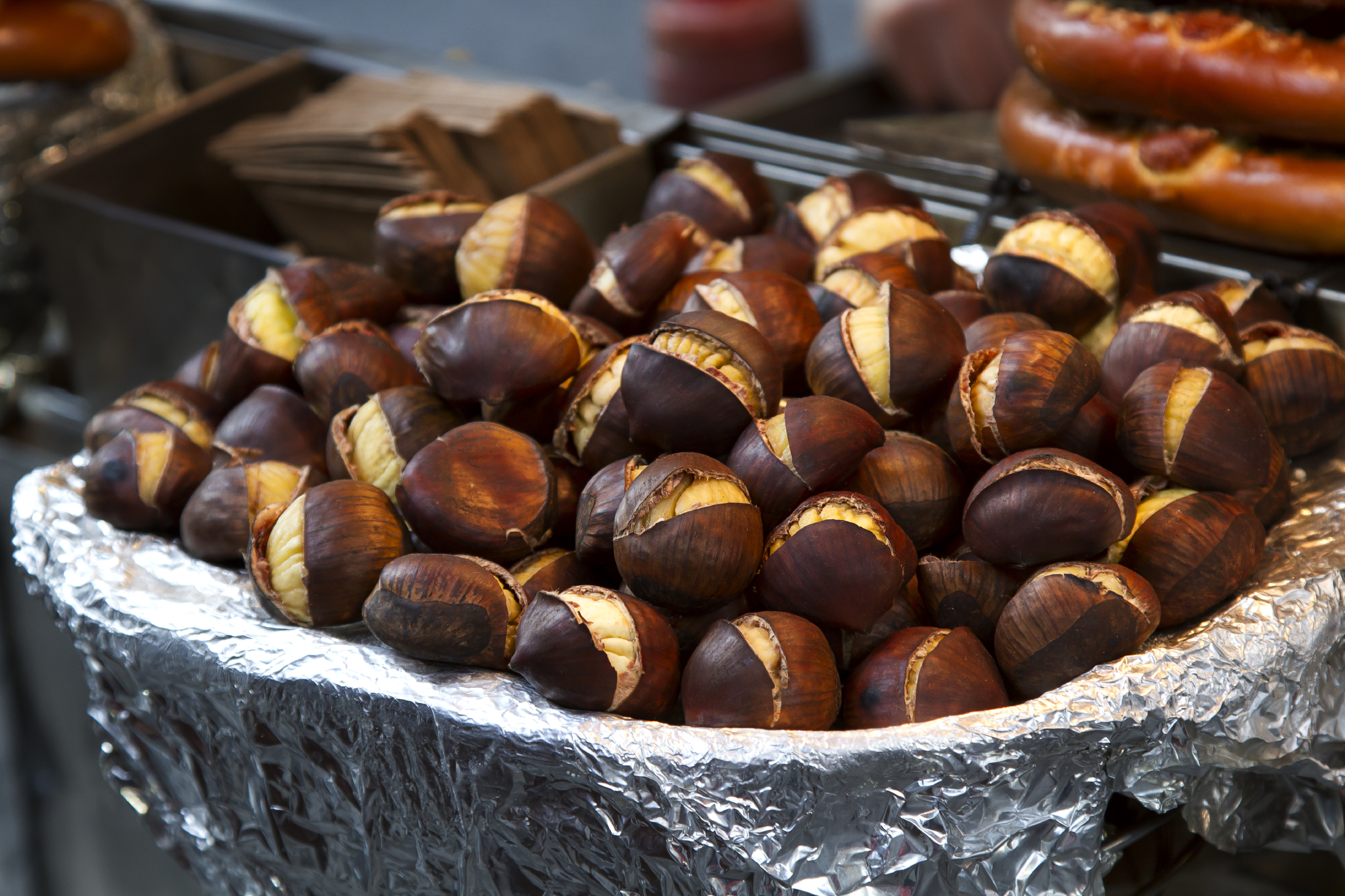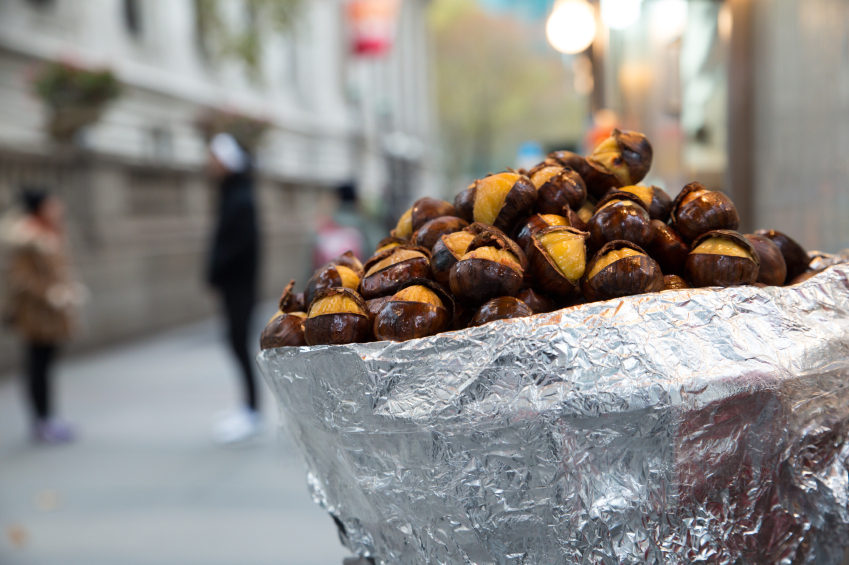
Chestnut Memories
Each year, during my 15 years of living in New York City, that wonderful aroma of chestnuts would waft gently through the crispness of winter. Their mysterious steam added a layer of Christmas to the heightened senses of Big Apple dwellers. I was always surprised at how creamy they were, these chestnuts roasted on an open vendor cart.
Season & Harvest
Chestnuts are available from October through December, henceforth dubbing them a Christmas, not just a cool season crop. They are also, as I just found out from this WZZM13 newscast, a growing crop in Michigan. Michigan has about 50 working chestnut farms right now. How cool is that?
In the newscast, WZZM13 interviewed Winkel Chestnut Farms and I was so fascinated by this new agricultural trend that I decided to give them a call and ask a few questions. The first chestnut lesson that owners Dick and Leslie Winkel taught me was that chestnuts bloom in July and August, but are usually harvested in September or early October. They are then put into cold storage with high humidity for a few months. This type of storage actually acts as a curing process because chestnuts sweeten as they age. Perfect timing for December roasting.
Pesticides & Allergies
The Winkels and I also briefly discussed pesticides, gluten and other allergen cross contamination, and different applications to keep the chestnuts fresh. A common pest is the potato leaf hopper, and most chestnut pests appear in the summer, just as the chestnut flowers / burrs start to form. Some farmers use pesticides, but Winkel Farms keeps bees for pollination, so in order to save the bees, they don't spray.
One of the issues that shocked me in our conversation at first, is that bleach and water is a common anti-mold technique after harvesting and before storage. According to the Food and Agricultural Association of the United Nations, chestnuts are highly susceptable to mold and various techniques are used around the world. Commonly, farmers can dunk the nuts after they fall from the tree into water and bleach to keep fungus at bay. The trees drop the nuts with or without the outer burr, but in the shell, so the meat of the nut is protected from the bleach. How protected is unclear, but the shells are quite tough. There are alternatives to this technique, and not everyone uses bleach in the water.
Allergy Note: Chestnuts belong to the same botanical family as oak and beech trees do. According to Kids with Food Allergies and FARE chestnuts are considered TREE NUTS. It appears that there are some folks who are only allergic to chestnuts and not other nuts, and others who are able to eat the chestnuts, but not other tree nuts. Tender Foodie will do a little more research on this.
No matter what, however, if you are ALLERGIC to TREE NUTS do not eat chestnuts without discussing with an informed physician and doing adequate allergy testing.
Also, gluten-free peops need to be mindful that cross contamination of nuts with gluten at the processing plant or at a vendor is a possibility.
I discussed with the Winkels how to find chestnuts that have not been cross contaminated with gluten. Their farm is a U-Pick farm so it takes the cross contamination question away -- you go to the farm and pick them up from the ground yourself. The U-Pick season is over, but something to keep in mind for next year. It's always good to develop a relationship with your local farmer and ask them questions about how they grow, store, pack, and process their products. This practice helps support local farms, biodiversity, and ourselves!
"I've been an aerospace engineer all of my life, and I didn't realize how complicated farming was until I started a chestnut farm! I worked my way through college as a crop dusting pilot and my love of light airplanes led me to aerospace engineering. The crop dusting gave me an interest in agriculture. It's been important to get the chestnut farm working. I don't know why except for the little voices in my head in the middle of the night. I had to pay attention to the call of the chestnuts."
~Dick Winkel, Winkel Chestnut Farms
Nutrition
Chestnuts have less fat and more starch than regular nuts, and are more like a sweet potato in starch content than a nut. They are relatively low in calories but rich in minerals like iron, calcium, magnesium, manganese, zinc, phosphorous, and potassium. Chestnuts, like green leafy vegetables and unlike most nuts, are also rich in folates, B Complex groups, and Vitamin C. Like other seeds and nuts, they are also full of bad cholesterol lowering (and good cholesterol raising) monounsaturated fats, like oleic acid.
Additionally, these little nuts make a great flour for gluten-free or grain-free baking, if you can find it. Oh yes they do.
How to Roast Chestnuts

Because of my wheat allergy and severe gluten sensitivity, I no longer can partake of those great street chestnuts in those romantic cities around the world. The risk of cross contamination is too great. But, we can roast them ourselves, can't we?
Here's how:
Choose chestnuts from a local farmer with whom you can discuss the risk of cross contamination. Fresh chestnuts are heavy for their size, glossy (not moldy), and rich in color. Score them (create little incisions in them with a knife) before roasting at an oven temp of 350 - 400 degrees Fahrenheit. The nuts have their own oils so you don’t need to use any oils during roasting. Martha Stewart has a simple, beautiful set of instructions here, and suggests a 350 degree roasting temp. Peel, salt (or don’t salt), and enjoy.
Want to grow some trees? Read this cool article on how to do so from Mother Earth News. Interesting tidbit: you need at least two chestnut trees to pollinate and 40 feet around each tree!
Read More About Local
Two Advantages of Buying from Small, Local Farms
2014 Locavore Index: See How Your State Ranks
Check Out Winkel Farms
Order Online from Allen Creek Farms
Labeled as gluten-free and still available as of this post date